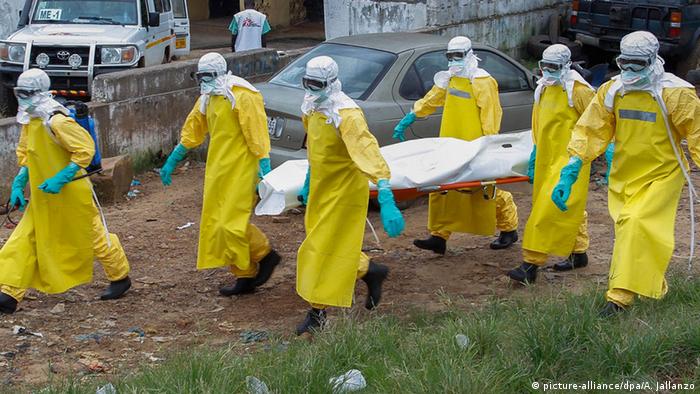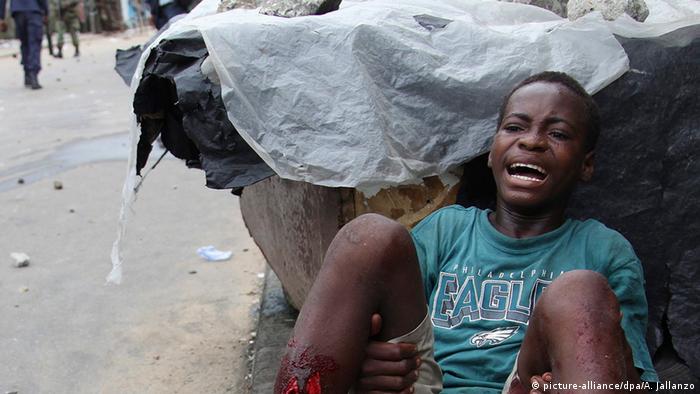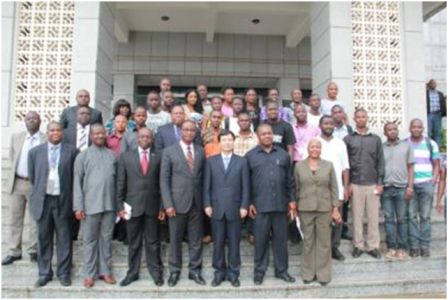His statement might alarm many people.
But Jonas Schmidt-Chanasit of the Bernhard Nocht Institute for Tropical
Medicine in Hamburg told DW that he and his colleagues are losing hope
for Sierra Leone and Liberia, two of the countries worst hit by the
recent Ebola epidemic.
"The right time to get this epidemic under control in these countries
has been missed," he said. That time was May and June. "Now it is too
late."
Schmidt-Chanasit expects the virus will "burn out itself" in this part of the world.
With other words: It will more or less infect everybody and half of the
population - in total about five million people - could die.
Stop the virus from spilling over to other countries
Schmidt-Chanasit knows that it is a hard thing to say.
He stresses that he doesn't want international help to stop. Quite the contrary: He demands "massive help".
For Sierra Leone and Liberia, though, he thinks "it is far from reality
to bring enough help there to get a grip on the epidemic."
According to the virologist, the most important thing to do now is to
prevent the virus from spreading to other countries, "and to help where
it is still possible, in Nigeria and Senegal for example."
Moreover, much more money has to be put into evaluating suitable vaccines, he added.

In Liberia, the death toll has risen to over 1000.
Angry reactions
In the headquarters of Welthungerhilfe, a German non-governmental aid
organization that is engaged in helping with the Ebola epidemic,
Schmidt-Chanasit's statement causes much contempt.
Such declarations "are not very constructive," a spokeswoman said.
Jochen Moninger, Sierra Leone based coordinator of Welthungerhilfe, told
DW, Schmidt-Chanasit's statement is "dangerous and moreover, not
correct."
Moninger has been living in Sierra Leone for four years and has experienced the Ebola outbreak there from the beginning.
"The measures are beginning to show progress," he says. "The problem is solvable - the disease can be stemmed."
"If I had lost hope completely, I would pack my things and take my
family out of here", Moninger adds. Instead, he and his family will
stay.
In Sierra Leone, the government has ordered a quarantine of 21 days for
every household in which an Ebola case occurred. Soldiers and police are
guarding these houses preventing anyone who has come into contact with
an Ebola patient from leaving.
According to Moninger, that is exactly the right thing to do: isolating
sick people - should it be necessary, even with military force.

When Liberia's government quarantined the slum area of West Point, frustration led to protest.
Creating hopelessness doesn't help
Moninger says he doesn't know much about the situation in Liberia. But
indeed, he got the impression that "there seems to be happening
something that is not good at all."
He grants that Schmidt-Chanasit's statement "might point a little bit into the right direction" regarding Liberia.
Liberia has not taken on the same quarantine measures as Sierra Leone.
According to a WOrld HEalth Organization (WHO) report, Ebola-infected
people are crisscrossing the capital in shared taxis, looking for a
treatment place and returning home after finding none. This way the
virus spreads.
"Distributing hopelessness", though, Moninger said, "is dangerous",
adding that there are many human lives at risk, and "statements like
these make the situation even worse".
Disastrous, but not without hope
The WHO in Geneva refuses to comment on Schmidt-Chanasit's statement.
WHO spokeswoman Fadéla Chaib, though, says that there is "of course" still hope for both countries.
"We can bring the situation under control in 6 to 9 months," she told DW.

When protesting against government's decision to quarantine West Point, residents have been injured.
She admits, though, that the situation especially in Liberia is "very intense".
The government is completely outstripped and as soon as a new Ebola
treatment center has opened, it is overflowed by patients, she says,
adding that Liberia has the highest number of cases and deaths in West
Africa with a 60 percent case-fatality rate.
The situation is getting worse after 80 health workers, doctors and nurses, have died after contracting the disease.
The WHO even expects
thousands of new cases of Ebola in Liberia over the next few weeks.
Winning together
Not only neighboring countries but also Europe and the US will have to
support the fight against the epidemic, WHO's Chaib demands.
Then it might be possible to win this fight.
The key to getting a grip on the epidemic is to stop the transmission of Ebola, especially in healthcare workers, she says.
Creating Ebola centers in the communities themselves will stop Ebola
patients and their family members moving around and infecting other
people.
"We will do everything we can to stop this Ebola outbreak. We will not let down West Africa."
http://www.dw.de/virologist-fight-against-ebola-in-sierra-leone-and-liberia-is-lost/a-17915090











 TRANSLATE
TRANSLATE
 Goghen
Goghen President
Ellen Johnson-Sirleaf has toured public and private health facilities
across Monrovia “to strengthen” health workers, as some doctors are now
escaping duties due to the deadly Ebola crisis.
President
Ellen Johnson-Sirleaf has toured public and private health facilities
across Monrovia “to strengthen” health workers, as some doctors are now
escaping duties due to the deadly Ebola crisis.



